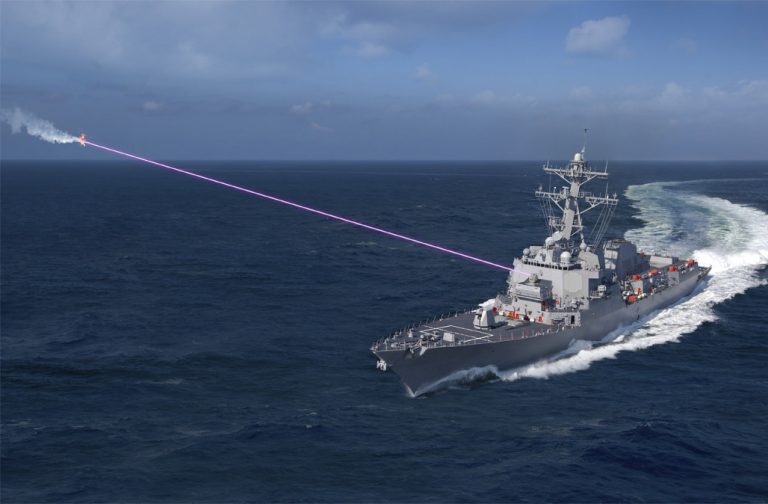In the next two years, the Navy wants to deploy a laser aboard a guided-missile destroyer as the service learns to integrate directed energy weapon systems on warships, the Navy’s director of surface warfare said on Wednesday.

Artist’s concept of a HELIOS laser system aboard a U.S. destroyer. Lockheed Martin Image
“We are going to burn the boats if you will and move forward with this technology,” Rear Adm. Ron Boxall said during the Booz, Allen, Hamilton and CSBA Directed Energy Summit 2019.
The service is targeting 2021 to install a High Energy Laser and Integrated Optical-dazzler with Surveillance weapon system aboard a West Coast Arleigh Burke-class Flight IIA destroyer, Boxall said.
The 60-kilowatt HELIOS, much more powerful than the 20-kilowatt laser weapon system the Navy tested aboard afloat forward staging base USS Ponce five years ago, is designed to counter small attack boats small unmanned aerial vehicles.
Last year, Lockheed Martin won a $150 million contract to develop two of the systems – one for shore testing and a second to be installed on a destroyer. The Navy initially planned for the installation in 2020 for what it is calling the Surface Navy Laser Weapon System Increment 1.
HELIOS will serve as an early test case to integrate a laser system into the Aegis combat system of the Navy’s surface fleet. Additionally, the laser system provides a new capability as a sensor to give more precise targeting data than a ship’s combat system.
Combining both the capabilities of the sensor and the offensive power Boxall said was the largest challenge to putting lasers aboard warships.
“The problem I have today is the integration of that system into my existing combat system. If I’m going to burn the boats, I’m going to replace something I have today with that system doing that mission with these weapons,” Boxall said.
“If I have this system that can kill and I have a system that can actually sense, then I have to make sure it integrates with the other things I have on my ship that can sense and kill, namely the Aegis weapon system.”
For the specific deployment on the destroyer in 2021, the Navy will have to learn the basics of using the laser tied to the ship’s combat system.
“It’s a crawl, walk, run approach,” Boxall said in answer to a USNI News question.
“Starting with the simple level, it’s closing the fire control loop and moving from there.
Fundamentally, we’re going to start to make sure we have a two-way input output from the laser into the combat system so we can track and sense using the laser. That’s a starting point and we’ll see how it progresses from there.”
Moving beyond the HELIOS installation, the Navy is working toward future increments of the SNLWS to be able to use the system against larger targets like anti-ship cruise missiles.